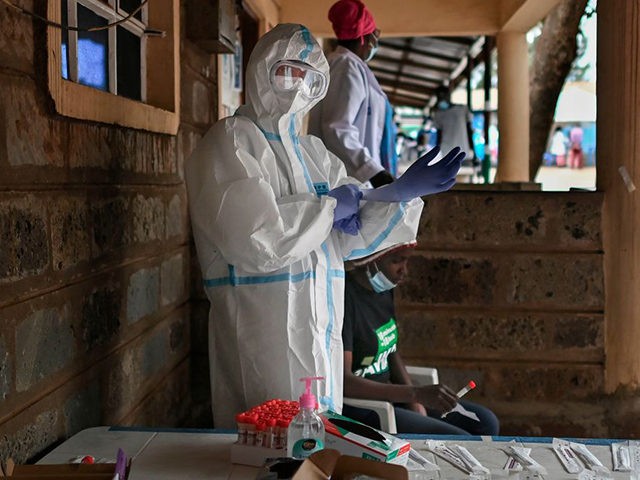Charles Juma, a manager in the Kenyan government agency responsible for organizing medical supplies, told lawmakers that his boss received death threats from the “deep state” if he did not give Coronavirus supply contracts to companies owned by their friends, the Daily Nation reported on Tuesday.
Juma is a procurement manager at the Kenya Medical Supplies Authority (Kemsa), the Nation noted, which is an agency under the Kenyan Ministry of Health. In September, the country’s Ethics and Anti-Corruption Commission announced a probe into Kemsa after identifying an “irregular expenditure” of about $72 million. Juma was suspended from his work for the duration of the investigation.
Kenya is among several African nations in which government officials are facing significant accusations of corruption related to emergency funding to fight the Chinese coronavirus pandemic. In Nigeria, police had to fend off looters at emergency food warehouses in November after impoverished locals, economically devastated by coronavirus lockdowns, began stealing food to feed themselves. Locals questioned why the food appeared only to go to those connected to the government or rot in warehouses.
In South Africa, President Cyril Ramaphosa delivered a speech in August accusing members of his own party, the left-wing African National Congress (ANC), of “looting” $26 billion in emergency coronavirus aid.
In Zimbabwe, Health Minister Obadiah Moyo was fired and arrested over an alleged $60 million corruption scheme involving coronavirus funding. The journalist responsible for uncovering the corruption, Hopewell Chin’ono, was also arrested.
The Daily Nation did not specify in its Monday report when Juma discussed the alleged death threats his superior at Kemsa received with the nation’s lawmakers. It reported that the allegations surfaced in remarks to the legislature’s National Assembly Public Investments Committee (PIC) regarding how Kemsa handed out contracts to corporations to secure enough medical supplies to treat coronavirus patients.
Juma said his boss, CEO Jonah Manjari, had claimed to receive death threats.
“The CEO told us that the deep state had threatened him that if he does not serve their interests, he will be made to disappear,” Juma said, later adding, “I was told some of the companies cannot be touched because the owners have influence at the Ministry of Health.”
Juma claimed that eight companies that did not have to endure the typically involved process of applying for contracts with the government nonetheless secured deals totaling 2.1 billion Kenyan shillings (about $19 million). Pressed repeatedly to identify who in the government was threatening Manjari’s life, or who he meant by “deep state,” Juma did not offer any names.
The only name the Nation said surfaced as far as government officials was a senator from Nairobi, Johnson Sakaja, who reportedly entered Manjari’s office on the same day that one of the dubious companies that received contracts, “Shop ‘N’ Buy,” did so. Juma did not indicate what Sakaja had to do with the contract, if anything. Sakaja is not listed as an official in any Shop ‘N’ Buy documentation.
Shop ‘N’ Buy was reportedly founded in February and has no significant history in selling medical supplies.
Juma insisted that Manjari was handing out contracts directly from his office rather than making companies go through the procurement process, which Juma led, that ensures the government gets fair deals from competent companies.
“Things started falling apart at Kemsa in April because commitment letters were being issued from the CEO’s office and not my office. If I had been given the opportunity to manage the procurement, nothing would have gone wrong. But the procurement process was hijacked by the CEO,” Juma reportedly said.
The Nation itself revealed in September that Juma appeared to prompt the cancelation of at least one suspicious contract with a company called Kilig. Juma reportedly sent a letter to his boss, Manjari, “questioning why the firm was chosen through a direct procurement in a tender that should be opened for a competition given its size,” the newspaper noted. The letter resulted in Manjari “hastily” revoking the contract.
Juma nonetheless continued to issue contracts to buy supplies to friendly companies, even when the government apparently had enough stock not to necessitate any more purchases. As none of these contracts apparently stood up to the rigorous process legally required, the government appears to have grossly overspent on products it did not need. In past corruption scandals around the world — most notably, the Odebrecht corruption scandal in Brazil — the overpaid revenue the contracting companies receives returns to the politicians securing the contract as a kickback. As the money starts off as government funds, taxpayers’ funds essentially end up in the pockets of politicians.
As of September, Kenyan officials found that Kemsa bought $72 million in “irregular” purchases that launched the current probe into the agency. A report from the Kenyan federal ethics watchdog released that month concluded that those in charge at Kemsa had “criminal culpability” in overspending and misspending.
The September report followed Manjari’s suspension in August, according to Reuters, after officials began to notice the outrageously high prices Kemsa was paying for some supplies. It also followed a raid on Kensa headquarters.

COMMENTS
Please let us know if you're having issues with commenting.